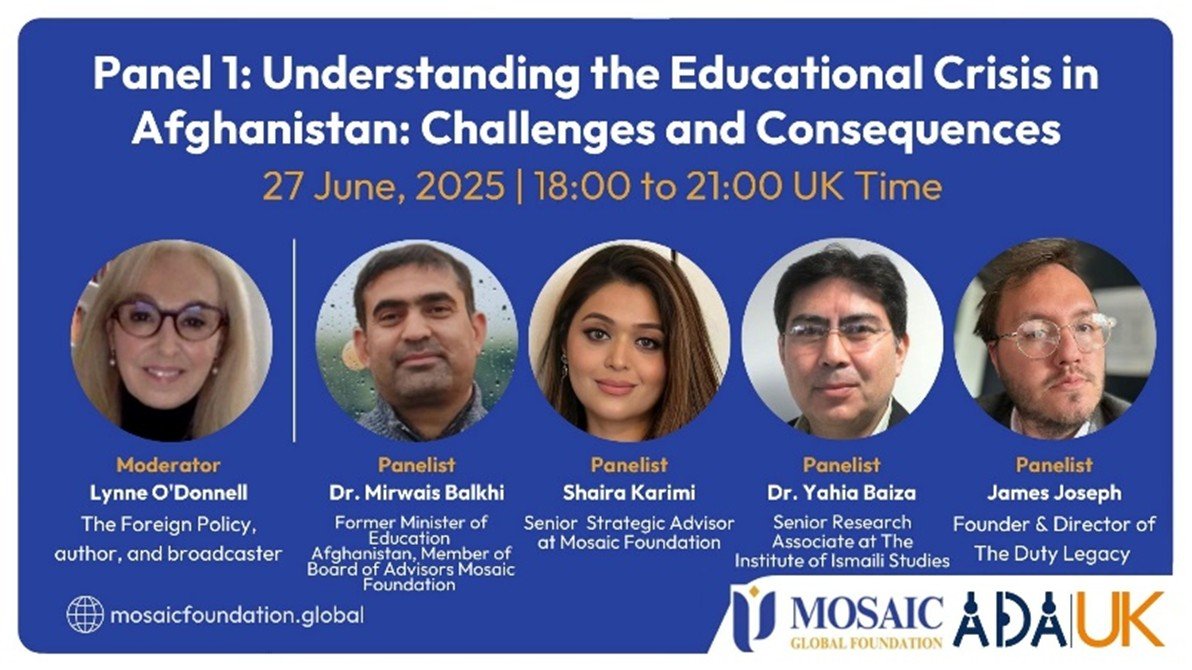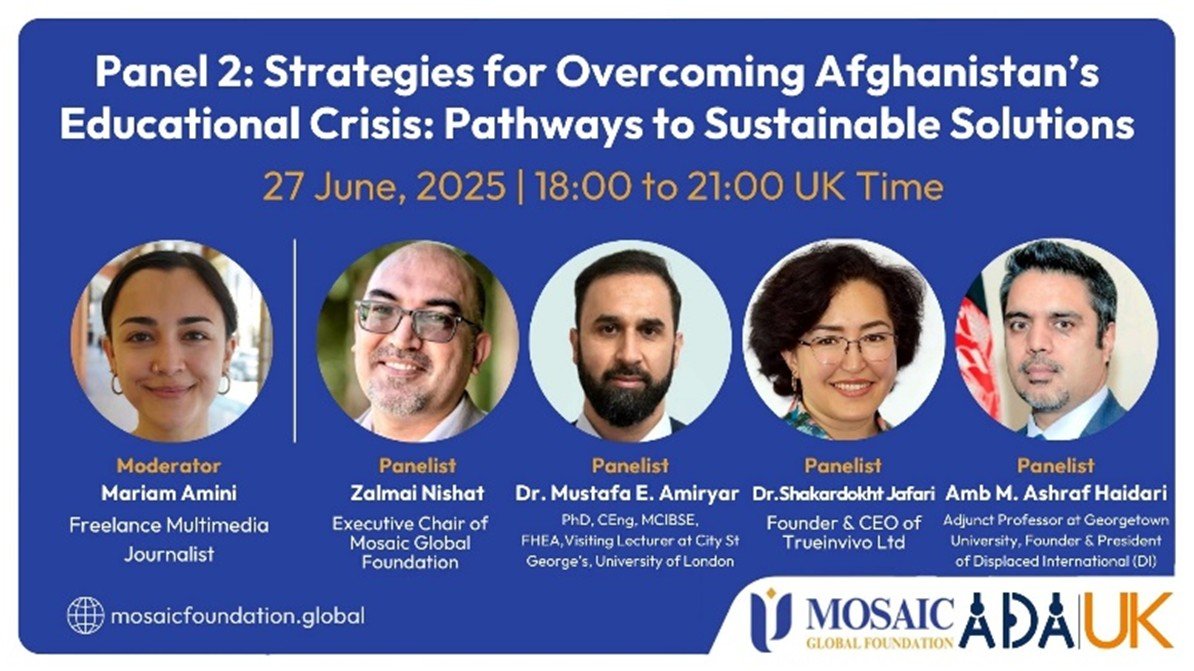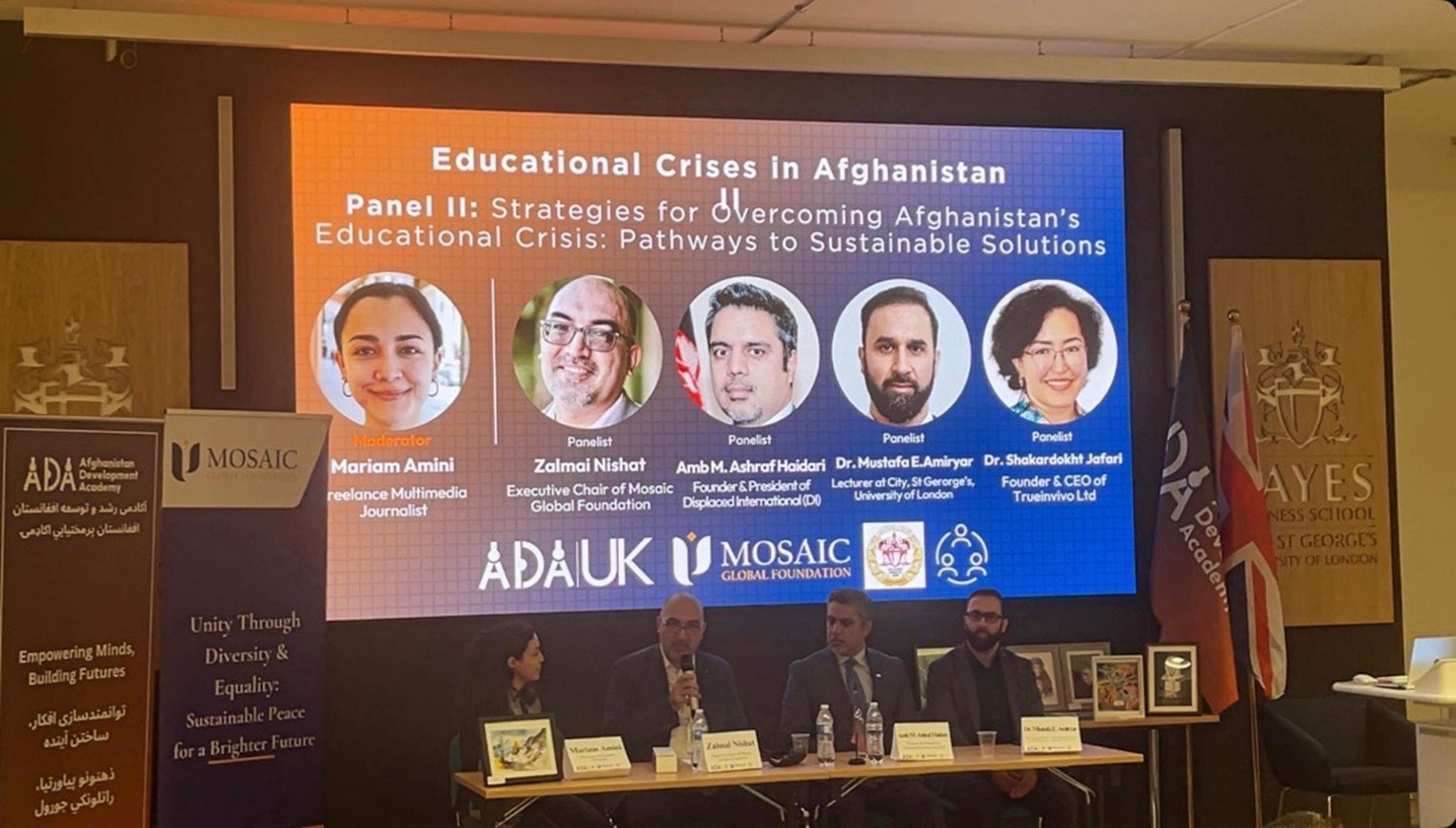
A collaborative event aimed at understanding the challenges facing Afghanistan’s education sector—and identifying strategies to empower vulnerable girls and counter radicalisation—was recently held in London.
Background
On 27 June 2025, an event entitled “Education Crisis in Afghanistan: Challenges, Consequences and Pathways to Sustainable Solutions” took place at Bayes Business School, London. Since the Taliban’s return to power in August 2021, they have imposed a ban on girls’ education beyond the sixth grade and adopted a strategy of mass radicalisation of youth through the establishment of thousands of religious seminaries, or madrassas—now estimated to number around 23,000 across the country. This policy not only restricts educational access, especially for girls, but also reinforces an ideological agenda.
The Taliban’s strategy aims to legitimise their narrow interpretation of Islam and entrench it as mainstream by proliferating madrassas and indoctrinating the younger generation.
The event brought together educators, former policymakers, development practitioners, and civil society representatives and students to examine the extent of the education crisis and to propose meaningful strategies for recovery and resilience. Discussions were organised around two panels:
- Understanding the Educational Crisis in Afghanistan: Challenges and Consequences
- Strategies for Overcoming Afghanistan’s Educational Crisis: Pathways to Sustainable Solutions
Understanding the Educational Crisis in Afghanistan: Challenges and Consequences
 Girls and women in Afghanistan are increasingly excluded from formal education, barred from universities, and denied employment opportunities—casting a pervasive sense of hopelessness over their futures. The Taliban’s restrictive policies have shattered aspirations and created a climate of fear and silence.
Girls and women in Afghanistan are increasingly excluded from formal education, barred from universities, and denied employment opportunities—casting a pervasive sense of hopelessness over their futures. The Taliban’s restrictive policies have shattered aspirations and created a climate of fear and silence.
At the same time, young men and women face the risk of ideological radicalisation through a growing network of madrassas. Classrooms that once nurtured curiosity and intellectual growth for girls now stand empty, while those for boys have become sites of indoctrination. The national curriculum is being reshaped to align schools with rigid religious instruction.
This bleak landscape not only threatens the personal and professional futures of millions of Afghanistan’s youth, but also poses serious risks to regional and global security. Panellists explored these developments alongside historical precedents of educational disruption during earlier periods of state collapse.
Strategies for Overcoming Afghanistan’s Educational Crisis: Pathways to Sustainable Solutions
Zalmai Nishat, Founder and Executive Chair of Mosaic Global Foundation, presented a powerful vision titled “Curriculum as Battleground: Resisting Radicalisation, Reclaiming Futures.” His presentation reframed the crisis not solely as a matter of access but as a deeper ideological struggle over the content and purpose of education itself.

He underscored that even if schools were reopened to girls tomorrow, the Taliban’s near-complete revision of the curriculum—designed to indoctrinate rather than educate—would pose a profound risk to Afghanistan’s future. This curriculum, rooted in imported fundamentalist traditions far removed from Afghanistan’s pluralist heritage, aims to normalise a narrow, exclusionary worldview under the guise of religion. He argued that education without inclusive and critical content can serve as a vehicle for radicalisation and structural uniformity.
In response, Mosaic’s approach includes short- and long-term strategies:
- Reviving the Republic-era Curriculum: As a transitional measure, Mosaic and its partners are adapting the pre-2021 curriculum, which, while imperfect, upholds values of pluralism, scientific inquiry, and gender equity. This framework is being used in community-based underground schooling, and digital initiatives—especially to reach girls and marginalised learners.
- Building a Curriculum Coalition: Zalmai proposed the formation of a coalition involving educators, diaspora professionals, and international allies committed to pluralistic and future-oriented education. The coalition’s aim is to revise the existing framework to reflect 21st-century skills, gender justice, civic values, and global citizenship.
- Forum/Alliance for Curricular Dialogue and Innovative Action: Recognising that curricula are inherently political and generational, he called for a standing platform to facilitate debate and co-creation of a shared educational vision.
Zalmai concluded that confronting the education crisis in Afghanistan requires not just humanitarian intervention, but educational imagination. A renewed curriculum is not merely a technical task, but an urgent national imperative.

Conclusion
The education crisis in Afghanistan is not merely a humanitarian emergency—it is an existential battle over the country’s moral, cultural, and intellectual future. This event offered both a sober diagnosis and a hopeful path forward. Panel One illuminated the devastating consequences of the Taliban’s educational restrictions and their long-term strategy of mass indoctrination, with a particular focus on the erasure of women and girls from public life and the manipulation of education as an ideological tool. Panel Two pivoted toward solutions—calling for strategic resistance through curricular reform, community resilience, technological innovation, and global solidarity.
At the heart of the discussions was a clear consensus: restoring education in Afghanistan requires more than rebuilding schools—it demands reclaiming the very purpose of education itself. It must empower, not subjugate; broaden minds, not narrow them; and anchor the country’s future in principles of inclusion, pluralism, and peace.
This event was a step toward that vision—and a call for sustained, collaborative action.
